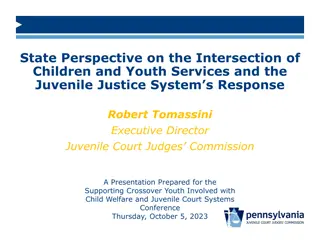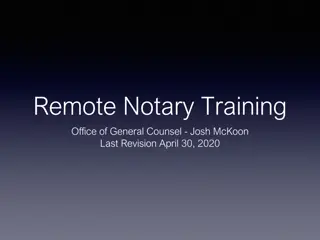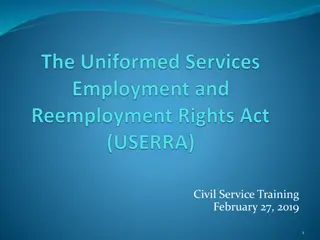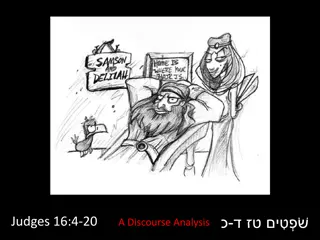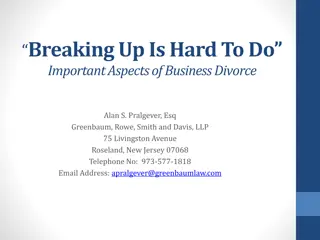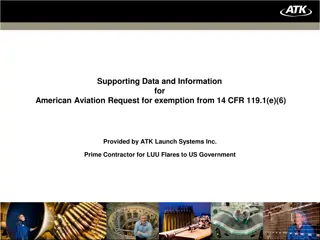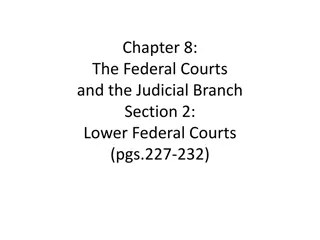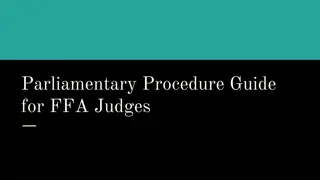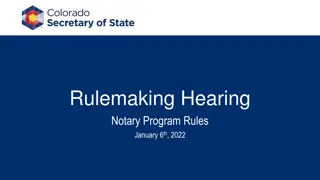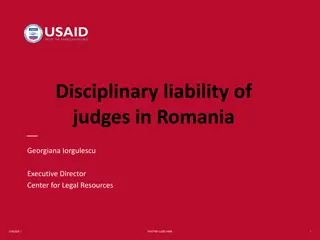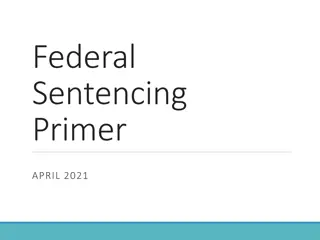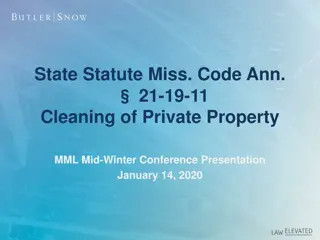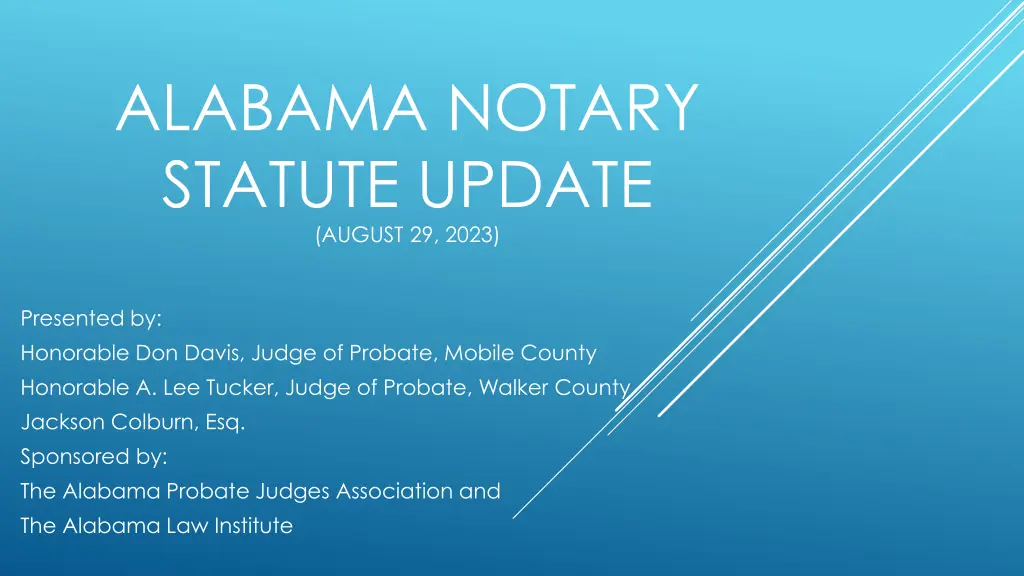
Alabama Notary Statute Update Details 2023
Explore the latest Alabama notary statute updates effective August 29, 2023, including changes to the notary application process, grounds for denial of a notary application, and crimes defined as felonies in Alabama. Stay informed on the new application requirements and disqualification criteria for notary applicants in the state.
Download Presentation

Please find below an Image/Link to download the presentation.
The content on the website is provided AS IS for your information and personal use only. It may not be sold, licensed, or shared on other websites without obtaining consent from the author. If you encounter any issues during the download, it is possible that the publisher has removed the file from their server.
You are allowed to download the files provided on this website for personal or commercial use, subject to the condition that they are used lawfully. All files are the property of their respective owners.
The content on the website is provided AS IS for your information and personal use only. It may not be sold, licensed, or shared on other websites without obtaining consent from the author.
E N D
Presentation Transcript
ALABAMA NOTARY STATUTE UPDATE (AUGUST 29, 2023) Presented by: Honorable Don Davis, Judge of Probate, Mobile County Honorable A. Lee Tucker, Judge of Probate, Walker County Jackson Colburn, Esq. Sponsored by: The Alabama Probate Judges Association and The Alabama Law Institute
CHANGES TO THE NOTARY APPLICATION PROCESS A uniform application form has been developed by the APJA/ALI which will be available on the APJA website beginning September 1, 2023 The application contains a statement that the new $10.00 application fee is non-refundable The application includes a perjury statement by the applicant The applicants are required to complete the APJA sponsored training within thirty (30) days of the date of the application (a copy of the training is included at the end of the handout) The application references an Alabama Driver License or Other ID. Other ID is one of the IDs mentioned in the voting laws for which a list can be found at https://www.sos.alabama.gov/alabama-votes/voter/voter-id. Additionally, there is a place on the application to indicate what type of document was utilized to verify residency. The application contains a box for court staff to initial once an Alacourt and PACER check has been completed Directions for accessing Alacourt and PACER will be discussed later in the presentation
GROUNDS FOR DENIAL OF A NOTARY APPLICATION The applicant is not a resident of Alabama The application has not been filed in the county in which the applicant resides The applicant has been convicted of a felony or crime of moral turpitude (lists in the following slides) The applicant is currently a debtor in a bankruptcy proceeding. Note that a discharged or dismissed bankruptcy would not be grounds for denial The applicant is under a current order adjudicating them incapacitated The applicant provided false information on their application The applicant failed to complete the training program within thirty (30) days of filing their application. (A judge of probate may extend the thirty (30) days for good cause shown. ) Completion of the training program will be required for renewals of a commission Form letters containing the above grounds for rejecting an applicant are included in the handout
CRIMES DEFINED AS FELONIES A felony is defined under Ala. Code 13A-1-2(8) as an offense for which a sentence to a term of imprisonment in excess of one (1) year is authorized. Some of the more common felonies under Alabama law would include but are not limited to the following: Murder and/or Capital murder Kidnapping 1stdegree and 2nddegree Rape 1stdegree and 2nddegree Domestic Violence 1stdegree and 2nddegree Burglary 1stdegree, 2nddegree, and 3rddegree Arson 1stdegree and 2nddegree Manslaughter Assault 1stdegree and 2nddegree Sodomy 1stand 2nddegree Robbery 1stdegree , 2nddegree, and 3rddegree Theft of property 1stdegree , 2nddegree, and 3rddegree Theft of services 1stdegree , 2nddegree, and 3rddegree Criminal mischief 1stdegree Receiving stolen property 1stdegree, 2nddegree, and 3rddegree Criminally negligent homicide Interference with custody Criminal Tampering 1stdegree
CRIMES OF MORAL TURPITUDE Murder Manslaughter Assaults Kidnapping 1stDegree Kidnapping 2ndDegree Rape Sodomy Sexual torture Sexual Abuse Enticing a child to enter a vehicle Facilitating solicitation with a child Electronic solicitation of a child Facilitating online solicitation of a child Traveling to meet a child Facilitating the travel of a child Human trafficking Terrorism Soliciting or support for terrorism Hindering prosecution of terrorism Endangering the water supply Possession of a destructive device Selling a destructive device Possession of a detonator, explosive Possession of a hoax device 13A-5-40(a)(1-19) 13A-6-3 13A-6-20 [except (a)(5)] and 13-6-21 13A-6-43 13A-6-44 13A-6-61; 13A-6-62 13A-6-63; 13A-6-64 13A-6-65.1 13A-6-66; 13A-6-67; 13A-6-69.1 13A-6-69 13A-6-121 13A-6-122 13A-6-123 13A-6-124 13A-6-125 13A-6-152; 13A-6-153 13A-10-152 13A-10-153 13A-10-154 13A-10-171 13A-10-193 13A-10-194 13A-10-195 13A-10-196(c) Attempt to commit an explosive crime Conspiracy to commit an explosive crime Hindrance disarming a destructive device Possession of a destructive device or weapon Treason Dissemination of obscene material Possession of obscene material Parent permitting child in obscene material Production of obscene material person under 17 Distribution of obscene material Trafficking in illegal drugs Bigamy Incest Torture of a child under the age of 18 Aggravated child abuse Prohibited acts sale or purchase of securities Burglary Aggravated theft by deception Theft of property Theft of lost property Theft of trademarks or trade secrets Robbery Forgery 13A-10-197 13A-10-198 13A-10-199 13A-10-200 13A-11-2 13A-12-191 13A-12-192 13A-12-196 13A-12-197 13A-12-200.2 13A-12-231 13A-13-1 13A-13-3 13A-15-3 13A-15-3.1 8-6-17 13A-7-5; 13A-7-6 13A-8-2.1 13A-8-3; 13A-8-4 13A-8-7; 13A-8-8 13A-8-10.4 13A-8-41; 13A-8-42; 13A-8-43 13A-9-2; 13A-9-3
NOTARY BONDS The amount of the notary bond has been increased from $25,000 to $50,000 The bond must be obtained from an Alabama licensed producer. The Alabama Department of Insurance s website contains a list of Alabama licensed producers, https://aldoi.gov. The bond must be payable to the State of Alabama In order to prevent a backlog of pending applications, it is suggested that the commissioning judge of probate require that the bonds be recorded with the probate court no later than forty (40) days from the date of the letter of appointment The bond must be executed, approved, filed, and recorded in the office of the judge of probate of the county of the notary s residence prior to the performance of any notarial acts
APPLICABLE FEES The non-refundable $10.00 application fee should be paid at the time the notary application is received The following fees should be collected at the time the bond is recorded: Issue Notary Commission $25.00 ( 36-20-70(a)) Proceedings Appointing Notary Public and Recording $15.00* ( 12-19-90(b)(39)) Approving Bond $10.00* ( 12-19-90(b)(13)) Certificate Without or With Seal $3.00* ( 12-19-90(b)(19) or ( 12-19-90(b)(20)) Any other local applicable fees Amendment to 12-19-90, the fees above would be $10.00, $5.00, and $1.00 or $2.00 respectively *Please note that any Category 2 County and Cullman County were exempt from the 2000
REQUIRED FORM AND CONTENT OF THE NOTARIAL ACT Must include an oath, acknowledgment, and signature of each party to the document, or his or her mark, and the signature of the notary public and their seal of office by either stamp or embossed impression The notary seal must include the name of the notary, the office, and the state for which they are appointed. The notary s name should match the name on their commission card. Any signature acknowledged by a notary public must be executed within the state and in the physical presence of the notary The statutory revisions did not change the statutory requirements for notarization by two-way audio-video communication technology
NOTARY FEES A notary public is allowed a reasonable fee, not to exceed $10.00 per each notarial act performed No fee may be charged by a state, county, or municipal employee for notarial acts performed during, and as part of, their public service It is strongly recommended that probate courts develop a written notary policy for probate court employees (an example of a probate court notary policy is included in your handout)
DISCIPLINE OF NOTARY PUBLICS A commissioning judge of probate may discipline a notary for a violation of the statute or on any grounds for which the judge of probate would have denied a notary application The commissioning judge of probate, or the successor in office, may issue a warning to a notary and/or restrict, suspend or revoke a notarial commission. A period of restriction, suspension, or revocation does not extend the expiration date of the commission. The commissioning judge of probate may order injunctive relief against any notary who violates these procedures, including ordering the surrender and destruction of a notary commission and notary seal.
CRIMINAL LIABILITY: MISDEMEANOR An individual will be guilty of a Class C misdemeanor if they do any of the following: hold themselves out to the public as a notary without being commissioned perform a notarial act with an expired, suspended, or restricted commission perform a notarial act before taking an oath of office charging a fee for a notarial act in excess of the maximum fee allowed taking an acknowledgement or administering an oath or affirmation without the principal appearing in person before the notary or following the procedures for remote notarization set out in this article taking an acknowledgement or administering an oath or affirmation without personal knowledge or satisfactory evidence of the identity of the principal taking a verification or proof without personal knowledge or satisfactory evidence of the identity of the subscribing witness
CRIMINAL LIABILITY: FELONY A notary will be guilty of a Class D felony if they do any of the following with intent to commit fraud or to intentionally assist in the commission of a fraudulent act: taking an acknowledgement or administering an oath or affirmation they know or reasonably believe to be false taking an acknowledgement or administering an oath or affirmation without the principal appearing in person before the notary or following the procedures for remote notarization set out in this article taking a verification or proof without the subscribing witness appearing in person before the notary or following the proper procedures for remote notarization performing a notarial act in Alabama with the knowledge that they are not properly commissioned Any individual who knowingly solicits, coerces, or in any material way, influences a notary to commit official misconduct is guilty as an aider and abettor and is subject to the same level of punishment as the notary.
ISSUES RAISED The language at large is contained in the example of a notary stamp. Although the statute does not specifically state that a notary seal has to contain the words at large, 36-20-70(a) refers to notaries public as being for the state at large. Given the fact that notaries at one point could be commissioned for a specific county, it is probably wise to include at large in the example. The training does not state that the stamp/seal has to match the example. As discussed in slide #23 of the APJA Notary Training and as required by 36-20- 73.1(g), even if two-way audio-visual communication is utilized, the notary still must apply their original signature and seal to the document. (This part of the statute was not changed by the Act.) The statute does not address what a notary is to do should they lose their seal. It might be best practice to report it to the probate judge; however, we are not aware of any unwritten, widespread policy or procedure that requires same. As the commission will expire every four (4) years, it will be necessary for the notary to complete the notary training within 30 days after submitting his or her application, as stated in 36-20-70(c)(7). As a new commission requires a new application, the notary training should be completed as stated in the statute.
HOW TO SET UPAN ALACOURT ACCOUNT AND A PACER ACCOUNT AlaCourt: To gain this access, please send the following information to ITsupport@alacourt.gov for the judge of probate AND the specific individual in your office, whom you wish to have that access: First and Last Name Address City State Zip Code Telephone Number Email Address County There is also a tutorial on how to conduct a search on Alacourt.com. If you have any questions beyond that tutorial, the Alacourt.com application has a Help feature that answers many questions for using the application. If you still need assistance, you can contact the Alacourt Help Desk at 866/954-9411 (option 1/option 4). PACER: To gain this access: https://pacer.psc.uscourts.gov/
ALACOURT CHECK FOR NOTARY PUBLIC APPLICANT 1 Login to Alacourt.com 2 Choose Party Search from the Main Menu. 3 Enter any known information for the party. You may search by Party Name, SSN or any combination of search options on the Party Search screen. Click the Search button once all information has been entered. Note: By default, the option for Party Type is set to All ; County is set to StatewideSearch and Division is set to AllDivisions . For a more scaled down search method, you may change any of these options for a specific Party Type, County or Division. You may also specify a range of filing dates or leave the default method, which will return all results in the database. If no results are found, use other criteria to search for the applicant.
4 Find the Applicant in the Search Results and click on the Case Number > View Case Details (PDF)
PACER CHECK FOR NOTARY APPLICANT 1 Login to PACER with the Username and Password for your account.
2 Select Find Parties on the PACER Case Locator Quick Search List.
3 Enter the Last Name and First Name of the Party (required), select all Party Role types and change the Court Type to All. Click Search to continue.
When is PACER free? You access $30 or less worth of court records within a quarterly billing cycle. Users are not billed unless they accrue charges of more than $30 in a quarter (January-March, April-June, July- September, October-December). Parties in a case (including pro se litigants) and attorneys of record receive one free electronic copy, via the notice of electronic filing or notice of docket activity, of all documents filed electronically, if receipt is required by law or directed by the filer. Accessing court opinions Viewing case information or documents at courthouse public access terminals.
REPORTING NOTARY MISCONDUCT Any party to a transaction requiring a notarial certificate for verification or any attorney licensed in Alabama who is involved in such a transaction in any capacity may execute an Affidavit of Notary Misconduct and file with either the Secretary of State or the commissioning judge of probate. This affidavit must state the actions which the affiant alleges are violations Upon receipt of the affidavit, the Secretary of State or the judge of probate shall forward the affidavit to the Alabama State Law Enforcement Agency Upon receipt of the affidavit, the Alabama State Law Enforcement Agency shall initiate and carry out, on their own or in coordination with the local law enforcement agencies, investigations of the violations Founded investigations will be referred to the appropriate district attorney for prosecution A copy of the Affidavit of Notary Misconduct with the instructions for filing same will be available on the APJA website.
Affidavit of Notary Misconduct (Notary Public Complaint) The attached form is designed to meet the statutory filing requirements pursuant to Alabama Code 36-20-75. This form and the information provided are not substitutes for the advice and services of an attorney. Commentary Alabama Code 36-20-75(d)(1) states that [a]ny party to a transaction requiring a notarial certificate for certification for verification and any attorney licensed in this state who is involved in such a transaction in any capacity, may execute an affidavit and file it with either the Secretary of State or the judge of probate who issued the commission to the notary public, setting forth the action which the affiant alleges are violations. The affidavit must be typewritten or legibly printed. Upon receipt of a properly submitted affidavit, the Secretary of State or the judge of probate who issued the commission to the notary public shall forward the affidavit to the Alabama Law Enforcement Agency, which will then initiate and carry out investigations of violations. Instructions for Form Notary Public Information: Include as much of the requested information as you know. Complainant Information: Provide contact information for the person alleging the misconduct. Witness Information: List the names and addresses of any witnesses who have personal knowledge of the alleged misconduct. Use an additional sheet if necessary. Allegations: Please select the specific allegation that best describes the nature of the notary misconduct. You may select more than one allegation. Provide relevant information relating to each allegation. Supporting Documentation: The affidavit must include copies of all documents that relate to the allegations made. Execution: Sign and date the last page of the affidavit before a notary public or other office authorized to perform an oath. Delivery Instructions: This affidavit and supporting documentation may be delivered either to the Office of the Alabama Secretary of State or to the office of the judge of probate who issued the commission to the notary public. If you wish to file with the Alabama Secretary of State, this affidavit and supporting documentation may be mailed to Administrative Services, P.O. Box 5616, Montgomery AL 36103-5616 or delivered to 600 Dexter Ave Ste S-105, Montgomery, AL 36130 as well. If you wish to file with the office of the judge of probate, you can find the appropriate judge of probate to file with, along with their office information, at https://www.sos.alabama.gov/city-county-lookup/probate-judges. Questions concerning the affidavit may be directed to the Administrative Services section of the Alabama Secretary of State at (334) 353-7854 or the clerk of the office of the judge of probate who issued the commission to the notary public. Drafted 07/2023


